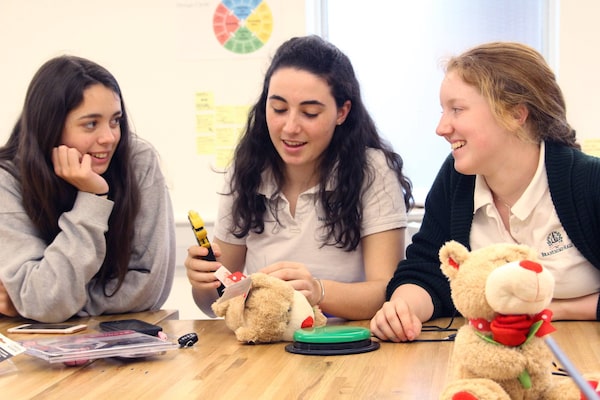
Branksome Hall students in Toronto rewire a bear for easy use by students with complex disabilities.Nicole Stoffman
Toronto's Branksome Hall school for girls expects all of its students to do their best, so when she was in Grade 10, Davina Field-Marsham decided to Do Right.
"It started as a Grade 10 Personal Project under the IB (International Baccalaureate) program," says Ms. Field-Marsham, now 16 and starting Grade 11.
"I am half Kenyan, and I chose to focus on maternal and newborn care in Kenya."
With help and supervision from one of her teachers, Trevor Ritchie, Ms. Field-Marsham developed a program that involved selling bracelets with silver charms that say Do Right, to raise funds for maternal health kits to be distributed to new mothers in Kenya.
The kits are handed out in villages as an inducement to the mothers to give birth in health clinics instead of possibly unsanitary conditions at home; the program has also been expanded to inmates at Nairobi's maximum-security prison for women.
"On average, 40 women a month in Kenya receive the kits," Ms. Field-Marsham says. In the summer, she travelled to Africa in a group that included two Branksome friends and their mothers to visit the recipients.
"Branksome encourages students to address causes that matter to us and to build a community around our passions," she says.
Encouraging imaginative and thoughtful community service is a feature that many independent schools regard as an important part of their educational mission. In addition to helping students develop individual projects, schools offer service trips to overseas communities, as well as opportunities to connect with inner-city students and Indigenous people.
"We call it service learning. As an IB school, our desired outcome is to develop globally minded citizens, so our work from junior kindergarten all the way to Grade 12 is based very much on this," says Denise Power, director of student life at Branksome.
At TFS-Canada's International School (originally Toronto French School), service learning is an integral part of the school's effort to educate its students as "citizens," says head of school Josep Gonzalez.
"Rather than talking about community service or charitable programs, we feel it's a question of social responsibility. We consider [service learning] as a way for our students to become the kinds of citizens who are going to strive for the betterment of humankind," he says.
"The world is our community, for which we have social responsibility."
In addition to encouraging and supporting individually designed programs like Ms. Field-Marsham's Do Right, Branksome's students and faculty work with the First Nations School of Toronto and the Best Buddies program, which enables students to develop friendships with students with intellectual handicaps.
Branksome has also partnered with a school in South Africa and has conducted service trips to teach English and help communities in Cambodia and Costa Rica.
For its overseas trips, Branksome tries to keep a ratio of one adult to four students, while programs that take place near its Toronto campus have a one-to-10 ratio, Ms. Power says.
Branksome's service learning includes involving students in its assistive tech club, working with students at Sunny View Public School in Toronto who have complex disabilities.
Girls in the youngest grades get involved in service by selling their handmade crafts in support of an organization called Children First Canada, that advocates for children, and Grade 7 and 8 students have signed a petition concerning water quality on a First Nations reserve called Shoal Lake 40.
For the out-of-school projects TFS participates in, both in Canada and abroad, the school is careful to be respectful, Dr. Gonzalez says. Its nearly 1,500 students come from all around the world, representing countries that speak more than 40 languages.
"The last thing we want to do is to have some kind of post-colonial approach where we do a little bit – we want something more profound that will have an impact in the long term. Many of our students are going to hold key positions in society; we want them to make a difference," he says.
"It's as much about our students learning from other people as they learn from us."
TFS service learning programs for 2017-18 include trips to India and China with the We organization, which involve building projects, teaching English and a cultural exchange. There is also a trip planned to Morocco, where TFS students can help build a school in a remote Berber village, and an expedition to Peru, where students last year helped gather wood to build balconies for people's homes.
Judith Gorry, TFS's director of student life, says that, unlike service trips at some other independent schools, students are not often accompanied by parents as chaperones.
It's not that parents are discouraged, she says: "The teachers line up to take part. They're really enthusiastic."
Adds Dr. Gonzalez: "The whole TFS community rallies around the idea of citizenship."
"We don't have a head boy or head girl – we have first citizens. Citizenship is so much a part of our school culture."
The impact of service learning is intended to be long-lasting on students, even permanent. While she digs into her Grade 11 courses at Branksome, Ms. Field-Marsham is busy organizing the next stages of her Do Right bracelet program.
"I should explain – the words 'Do Right' stand not just for doing right for maternal health. They stand for doing right for everyone," she says.